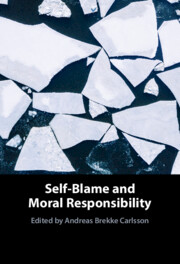Book contents
- Self-Blame and Moral Responsibility
- Self-Blame and Moral Responsibility
- Copyright page
- Contents
- Contributors
- Acknowledgments
- Introduction
- Part I The Nature of Self-Blame
- Part II The Ethics of Self-Blame
- Part III Self-Blame and Moral Responsibility
- Chapter 8 Guilt and Self-Blame within a Conversational Theory of Moral Responsibility
- Chapter 9 Deserved Guilt and Blameworthiness over Time
- Chapter 10 Blame, Deserved Guilt, and Harms to Standing
- Chapter 11 Reason to Feel Guilty
- References
- Index
Chapter 10 - Blame, Deserved Guilt, and Harms to Standing
from Part III - Self-Blame and Moral Responsibility
Published online by Cambridge University Press: 05 May 2022
- Self-Blame and Moral Responsibility
- Self-Blame and Moral Responsibility
- Copyright page
- Contents
- Contributors
- Acknowledgments
- Introduction
- Part I The Nature of Self-Blame
- Part II The Ethics of Self-Blame
- Part III Self-Blame and Moral Responsibility
- Chapter 8 Guilt and Self-Blame within a Conversational Theory of Moral Responsibility
- Chapter 9 Deserved Guilt and Blameworthiness over Time
- Chapter 10 Blame, Deserved Guilt, and Harms to Standing
- Chapter 11 Reason to Feel Guilty
- References
- Index
Summary
Central cases of moral blame suggest that blame presupposes that its target deserves to feel guilty, and that if one is blameworthy to some degree, one deserves to feel guilt to a corresponding degree. This, some think, is what explains why being blameworthy for something presupposes having had a strong kind of control over it: only given such control is the suffering involved in feeling guilt deserved. This chapter argues that all this is wrong. As evidenced by a wider range of cases, blame doesn’t presuppose that the target deserves to feel guilt and doesn’t necessarily aim at the target’s suffering in recognition of what they have done. On the constructive side, the chapter offers an explanation of why, in many cases of moral blameworthiness, the agent nevertheless does deserve to feel guilt. The explanation leans on a general account of moral and non-moral blame and blameworthiness and a version of the popular idea that moral blame targets agents’ objectionable quality of will. Given the latter idea, the morally blameworthy have harmed the standing of some person or value, giving rise to obligations to give correspondingly less relative weight to their own standing, and so, sometimes, to their own suffering.
Information
- Type
- Chapter
- Information
- Self-Blame and Moral Responsibility , pp. 198 - 216Publisher: Cambridge University PressPrint publication year: 2022
Accessibility standard: Unknown
Why this information is here
This section outlines the accessibility features of this content - including support for screen readers, full keyboard navigation and high-contrast display options. This may not be relevant for you.Accessibility Information
- 2
- Cited by
